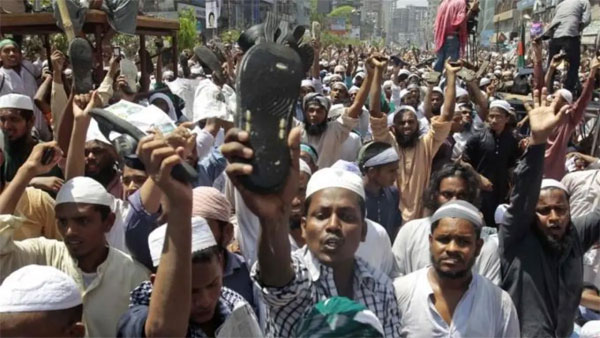Daijiworld Media Network - New Delhi
New Delhi, Oct 7: Indian intelligence agencies are closely monitoring the increasing activities of Hefazat-e-Islam (HeI), a radical Islamist group based in Bangladesh, amid growing fears that its hardline agenda may spill across the border.
The group, known for its extremist views, has launched fierce opposition against women's rights reforms in Bangladesh. Its latest target: the Women’s Affairs Reform Commission, which has recommended granting equal rights to women across all religions in matters of marriage, divorce, inheritance, and maintenance. Hefazat has demanded that the commission be dismantled entirely.
Indian officials believe Hefazat-e-Islam operates as an extension of Jamaat-e-Islami, a banned Islamist political group in Bangladesh. According to sources, Hefazat is being used to pursue a radical agenda — including suppressing minorities, enforcing Sharia law, and dismantling secular structures.

Although its primary focus remains within Bangladesh, India remains vigilant. Intelligence reports suggest that HeI has attempted to establish sleeper cells within Indian territory — particularly in the Northeast and West Bengal — using illegal immigrants from Bangladesh as conduits to spread extremist ideology.
While HeI has had limited success in India so far, officials aren’t taking any chances. “Movements like these can quickly spiral out of control,” one official warned, emphasizing the risks of communal unrest and homegrown radicalization.
There are also concerns that existing Bangladesh-based terror modules within India may be exploited by HeI to incite violence or stage anti-government protests. The group has demonstrated its hostility towards India in the past — most notably during Prime Minister Narendra Modi’s 2021 visit to Bangladesh, which saw violent demonstrations led by HeI resulting in 13 deaths.
HeI’s ambitions go beyond protests. It envisions an Islamic state in Bangladesh, aligned with Pakistan’s ideological and strategic goals, including the controversial idea of annexing parts of India’s Northeast to merge with Bangladesh — a claim Indian agencies find deeply alarming.
With the political climate in Bangladesh shifting following the exit of Prime Minister Sheikh Hasina, groups like HeI and Jamaat-e-Islami are gaining ground. HeI has emerged as a powerful political pressure group, aligned with several Islamist factions, including the Khilafat-e-Majlis Party.
Mamunul Haq, HeI’s Joint Secretary, has publicly declared the group’s intention to enter Parliament in the upcoming elections, vowing to push for full implementation of Sharia law. Backed by what they claim is a network of 500,000 supporters, HeI sees itself as a rising political force.
For India, the stakes are high. A government in Dhaka with significant HeI or Jamaat influence could drastically alter regional dynamics — and not in New Delhi’s favor. Officials warn that such a regime would likely act as a proxy for Pakistan’s Inter-Services Intelligence (ISI), jeopardizing years of diplomatic progress between India and Bangladesh.
As elections approach in Bangladesh, Indian security and foreign policy establishments are keeping a close eye — not just on the ballots, but on the potential rise of a hardline regime with cross-border implications.